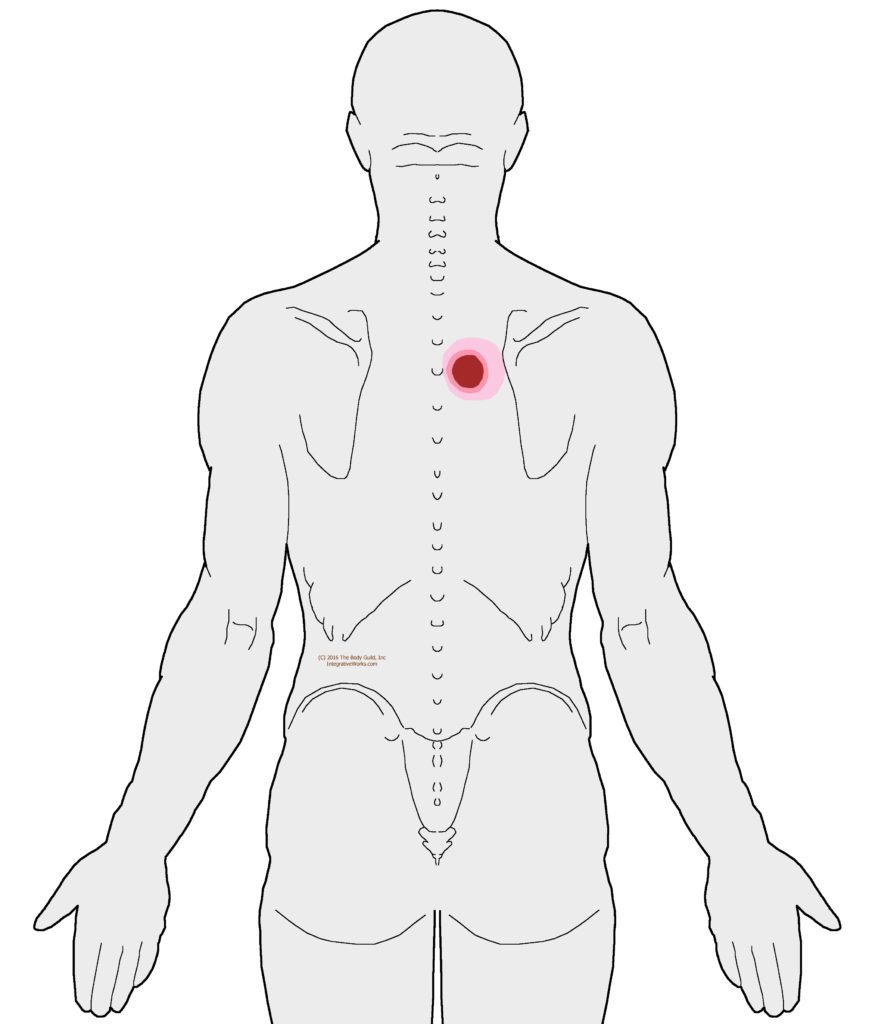Sharp Pain Between the Shoulder Blades
Table of Contents
- How People Describe This Pain Pattern
- How You Activate and Intensify This Pain Pattern
- Self-Care – Getting Relief on Your Own
- Musculoskeletal Anatomy Behind Your Pain
- Therapy Notes for Massage and Bodywork
Want to skip ahead?
Here’s a link to my post about
getting relief on your own.
How People Describe This Pain Pattern


People complain of sharp pain along the spine of the upper back between the shoulder blades. The intensity varies a great deal. It can be nagging and achy or sharp during a deep breath. Although there are several patterns between the shoulder blades, this one is right along the spine. Often, people complain of an out-of-place vertebra. People complain about their trunk movement and breathing and not about pain in their arms and neck.
May be a Bit Higher or Lower
This illustration shows a focus of pain along the thoracic spine, where this often occurs. It may also occur above and below the spot shown, along the spine and ribs. Trigger points in these tiny muscles between the vertebrae create this sharp pain.
When it is more severe and creates a sharp pain on breathing, People often described it as a rib head that is out. There is some truth to that. A twist in a vertebra is often associated with this pain. The rib head, which seats into that rib, is not seated well. For the practitioner, this creates a firm, raised bump right there.
How You Activate and Intensify This Pain Pattern
Cold Pressed
People complain of this after an awkward position with their arms raised, like painting or installing tile. It can also happen when sitting in an uncomfortable chair at a conference, especially when the stiff back of the chair presses into a specific spot in your back. At times, clients report a sharp pain after sleeping on a cold or hard surface. I’ve had that myself.
Twist and Ouch
Some people wake up with sharp pain in the upper back after a previous day of some unusual activity like gardening or moving. As well, it can result from a twisting fall or motor vehicle accident. Sometimes it is twisting while precariously balanced or sneezing creates this sharp pain between the shoulder blades.
The Musculoskeletal Anatomy Behind Your Pain
These tiny muscles adjust the tension and position of the vertebrae. They overlap to create a complex set of guy wires to stabilize the spine. Cervical multifidi produce different referral patterns. I discuss them in this post.
You can read more about them in this post about multifidi and rotatores.
Getting Relief on Your Own
Clinically Proven
Self-Care Strategies
This post has strategies for getting relief on your own. Explore how to change your activities, stretch, and other strategies that relieve the pain associated with this trigger point.
Therapy Notes for Massage and Bodywork
Better Bodywork
Through Shared Expertise
This post has techniques, tips, treatment routines, and anatomy illustrations to improve the bodyworker’s approach.
Support Integrative Works to
stay independent
and produce great content.
You can subscribe to our community on Patreon. You will get links to free content and access to exclusive content not seen on this site. In addition, we will be posting anatomy illustrations, treatment notes, and sections from our manuals not found on this site. Thank you so much for being so supportive.
Cranio Cradle Cup
This mug has classic, colorful illustrations of the craniosacral system and vault hold #3. It makes a great gift and conversation piece.
Tony Preston has a practice in Atlanta, Georgia, where he sees clients. He has written materials and instructed classes since the mid-90s. This includes anatomy, trigger points, cranial, and neuromuscular.
Question? Comment? Typo?
integrativeworks@gmail.com
Follow us on Instagram
*This site is undergoing significant changes. We are reformatting and expanding the posts to make them easier to read. The result will also be more accessible and include more patterns with better self-care. Meanwhile, there may be formatting, content presentation, and readability inconsistencies. Until we get older posts updated, please excuse our mess.